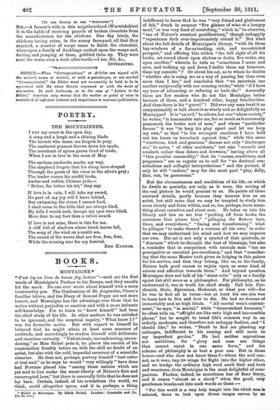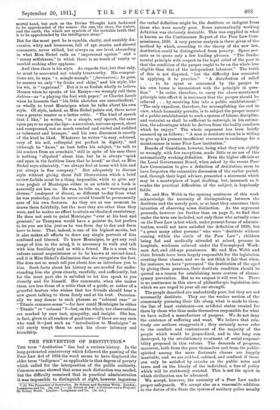BOOKS.
MONTAIGNE.*
" Cut icy un livre de bonne fay, lecteur"—ench are the first words of Montaigne's Preface to his Essays, and they exactly hit the mark. No one ever wrote about himself with a more trustworthy pen. The Confessions of St. Augustine, Cicero's familiar letters, and the Diary of Samuel Pepys are not more honest, and Montaigne has the advantage over them that he writes without prejudice or emotion and with a more intimate self-knowledge. For to learn to " know himself " had been the chief study of his life. In other matters he was satisfied to be ignorant, and the sceptical inquiry, "What know I ? " was his favourite motto. But with regard to himself he believed that he might attain at least some measure of certitude, and accordingly he studies himself with deliberate and ceaseless curiosity. " Unhistrionic, uncondemning, uncon- doning," as Miss Sichel puts it, he places the results of his examination frankly before us, with the skill no doubt of an artist, but also with the cold, impartial accuracy of a scientific observer. He does not, perhaps, portray himself "tout entier at tout nod," as he says he would " very willingly " have done had Fortune placed him " among those nations which are yet said to live under the sweet liberty of Nature's first and uncorrupted laws," but there is assuredly little that he does not lay bare. Certain, indeed, of his revelations the world, we think, could altogether spare, and it is, perhaps, a thing • Michel de Mentaiyea, By Edith Sichel. London: Constable and Co. 17s. 6d. net.] indifferent to know that he was "very friend and gluttonous of fish," drank in summer "five glasses of wine at a hungry
meal," or was very fond of scratching," which is," he observes, "one of Nature's sweetest gratifications," though unhappily
"repentance doth over-importunately attend it." But what about the full details of Montaigne's library, "with its three bay-windows of a far-extending, rich, and unrestricted prospect," and offering him within " the full sight of all his books, set round about upon shelves or desks, five ranks, one upon another," wherein he tells us "sometimes I muse and rave, and walking up and down I indite these my humours, these my conceits " ? Or about his cat, as to whom he doubts " whether she is using me as a way of passing her time even more than I her," and concludes that " we entertain one another reciprocally with our cunning tricks," while "if I have my hour of advancing or refusing so bath she." Assuredly there are few readers who do not like Montaigne better because of these, and a hundred other, happy familiarities. And then there is his " gravel " I Did ever any man treat it so companionably or talk about it so wisely and so delightfully as Montaigne? It is "an evil," he allows, but one "whose society," he writes, " is honourable unto me, for so much as it commonly possesseth the better sort of men," and whose "particular favour" it was "to keep his play apart and let me keep my own," so that "in his strongest emotions I have held out ten hours on horseback against him," while this same "courteous, kind, and gracious" disease not only "discharges me," he notes, " of other accidents," but also " rouseth and awaketh rather than deters and drowsies," having above all " this peculiar commodity," that its " causes, conditions, and progresses " are so regular as to call for " no doctoral con- sultations and collegial interpretations " and the patient, if only he will " endure," may for the most part " play, daily, dine, run, be gamesome."
But the circumstances and conditions of his life, on which he dwells so quaintly, are only, as it were, the setting of the real picture he would present to us. He paints all these outward details, partly because they interest him as an artist, but still more that we may be tempted to study him more closely and from within, and so, too, perhaps, learn some- thing about ourselves and about men. He takes us into his library and lets us see him "pecking off from books the sentences that please him," " pillaging the flowers here, there, and everywhere," "fusing and transforming" what he pillages "to make thereof a venture all his own," in order that we may understand his mind and how we may improve our own. His cat is not only a symbol of that quietude, or " Ataraxie " which be thought the best of blessings, but also a reminder that in comparison with animals man " has no prerogative or essential pre-excellency," and that " consider- ing that the same Master hath given us lodging in this palace for his service, and that they belong, like us, to his family, Nature bath good reason to enjoin upon us some kind of esteem and affection towards them." And beyond question Montaigne does not talk of his " stone colic " only as a kindly egoist but still more as a philosopher. For philosophy, as he understood it, was in truth his chief study. Call him Pp.- rhonist, Stoic, Epicurean, Hedonist, or what you will—for he was in fact all in turns—but at least his one aim was to learn how to live and how to die. He had no dreams of immortality and no high ideals. " All mortal men's content- ment," he says, "is mortal," while "transcendent humours," he often tells us, "affright me like unto high and inaccessible places," but he sought to tread life's common way in an orderly, moderate, and therefore not unhappy fashion, and "I should like," he writes, "Death to find me planting my cabbages, indifferent to his coming and still more to my imperfect garden." He had neither aspirations nor ambitions, for " glory and ease are things that cannot squat in one same form," and his scheme of philosophy is at best a poor one. But in those hours—and who does not know them ?—where the soul can- not, as it were, imp its wings for flight into the higher ether, and we trudge the ordinary high road amid dust and heat and weariness, then Montaigne is the most delightful of com- panions. Flashes, indeed, he sometimes has of finer fancy, and it comes "almost as a shock" when the good, easy gentleman breaks out into such words as these :- " For this world is a very holy temple into the which mania ushered, there to look upon divers images careen by no
mortal hand, but such as the Divine Thought hath fashioned to be apprehended of the senses: the snn, the stars, the waters, and the earth, the which are symbols of the invisible truth that is to be apprehended by the intelligence alone."
But for the most part be is equable, chatty, and amiably dis- cursive, witty and humorous, full of apt stories and shrewd comments, never stilted, but always on our level, abounding in what Miss Sichel calls an " impersonal egoism " and a " sunny selfishness," in which there is no touch of vanity or morbid seeking after applause.
And then there is his style. As regards that, but that only, be must be accounted not wholly trustworthy. His composi- tions are, he says, " a mingle-mangle " (farcisseure); he goes, be assures us, only " by frisks and skips," and his style, like his wit, is " vagabond." But it is as foolish wholly to believe Horace when be speaks of his Essays—we wrongly call them Satires—as "a playing the fool with paper," or Charles Lamb when he laments that " his little sketches are unmethodical," as wholly to trust Montaigne when he talks about his own style. Of style, indeed, as Miss Sichel points out, there never was a greater master or a better critic. " The kind of speech that I like," he writes, " is a simple, naif speech, the same upon parer as upon the lips—a succulent, nervous speech, short and compressed, not so much combed and curled and coddled as vehement and brusque," and his own discourse is exactly of the kind he liked. Whatever he writes "is easy, coloured, racy of his soil, colloquial yet perfect in dignity," and although he "dares," as best befits his subject, "to talk to his readers from an armchair," still in spite of his ease there is nothing "slipshod" about him, but be is always "spick and span in the faultless linen that he loved," so that, as Miss Sichel says admirably, "we always feel at home with him and yet always in fine company." But adequately to discuss style without giving those full illustrations which a brief review forbids must be a thing impossible, while to give any true poil,ait of Montaigne either in an article or a book is assuredly not less so. He was, he tells us, so " wavering and diverse" (ondoyant et divers), so different to-day from what he was yesterday, that he never could himself be permanently sure of his own features. As they are at one moment he draws them faithfully, but the next they are other than they were, and he makes no effort to attain an idealized consistency. He does not seek to paint Montaigne "ever at his best and greatest," as Tennyson would have a painter do, but prefers to let you see him just as he was from day to day and from hoer to hour.' That, indeed, is one of his highest merits, but it also makes all efforts to draw any single portrait of him confused and blurred.- To know Montaigne, to get any real image of him in the mind, it is necessary to walk and talk with him familiarly and as with a friend. He is a man who refuses casual acquaintance or to be known at second-hand, and it is Miss Sichel's distinction that she recognizes the fact. She does not so much tell-you about him as introduce you to him. Such facts about his history as are needed for under- standing him she gives clearly, carefully, and sufficiently, but for the most part she is satisfied to let him speak to you directly and for himself. Her comments, when she makes them, are less those of a critic than of a guide, or rather of a graceful hostess who wishes that her friends should bear a new guest talking to them freely and at his best. Occasion- ally we may demur to such phrases as "colossal ease" or " Titanic common-sense "—for how could Montaigne be either " Titanic " or " colossal "?—but, on the whole, her observations are marked by rare tact, sympathy, and insight. She has, in fact, given to all readers of good taste—if there are any such who read it—just such an "introduction to Montaigne" as will surely tempt them to seek his closer intimacy and friendship. '











































 Previous page
Previous page